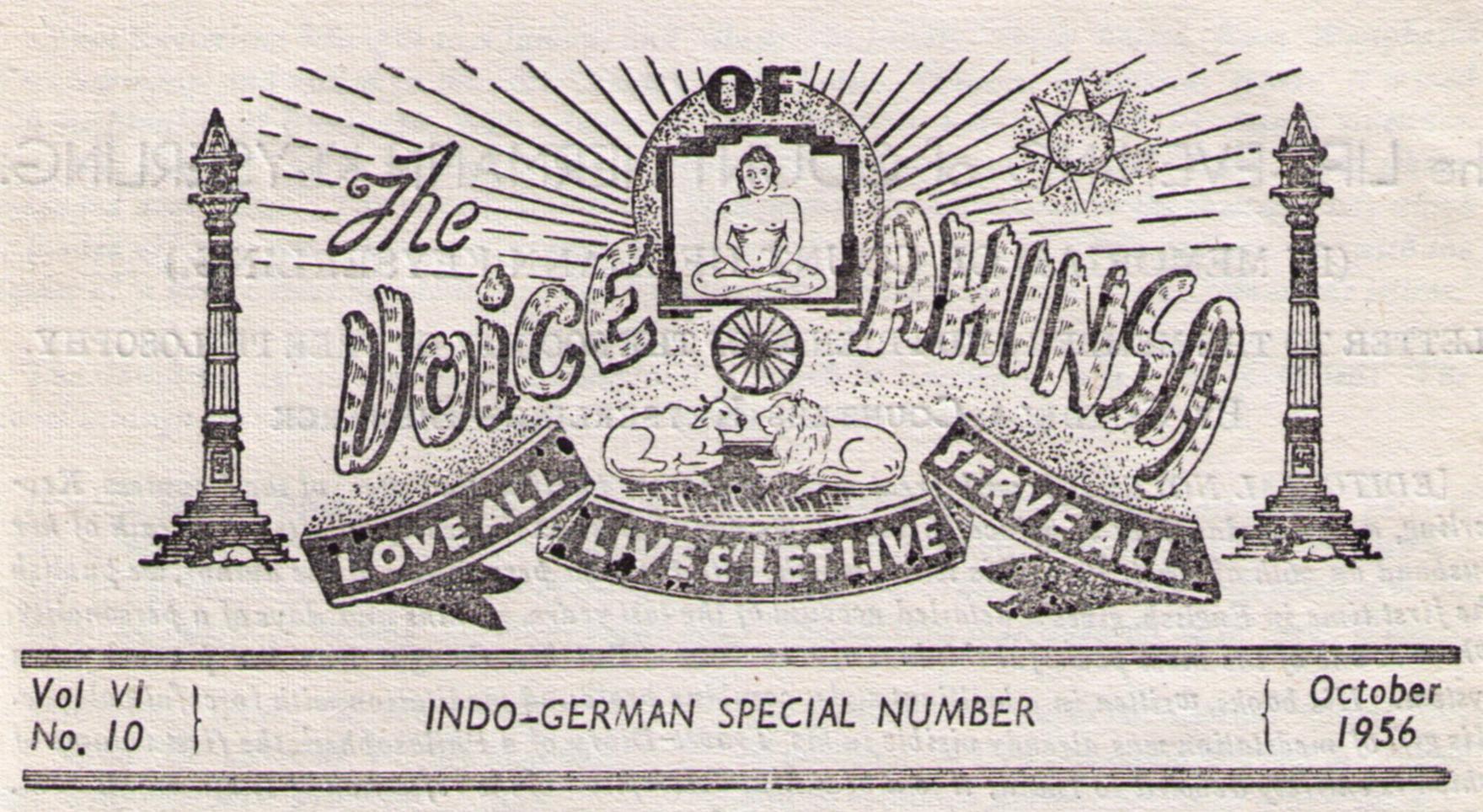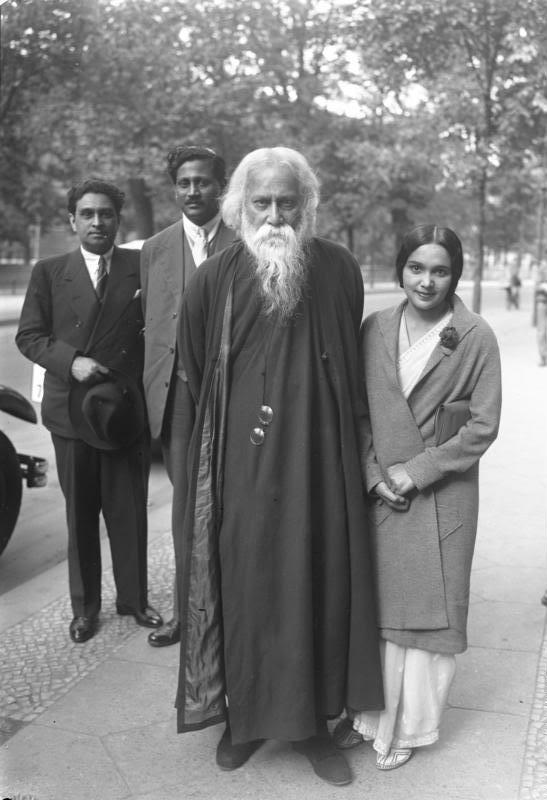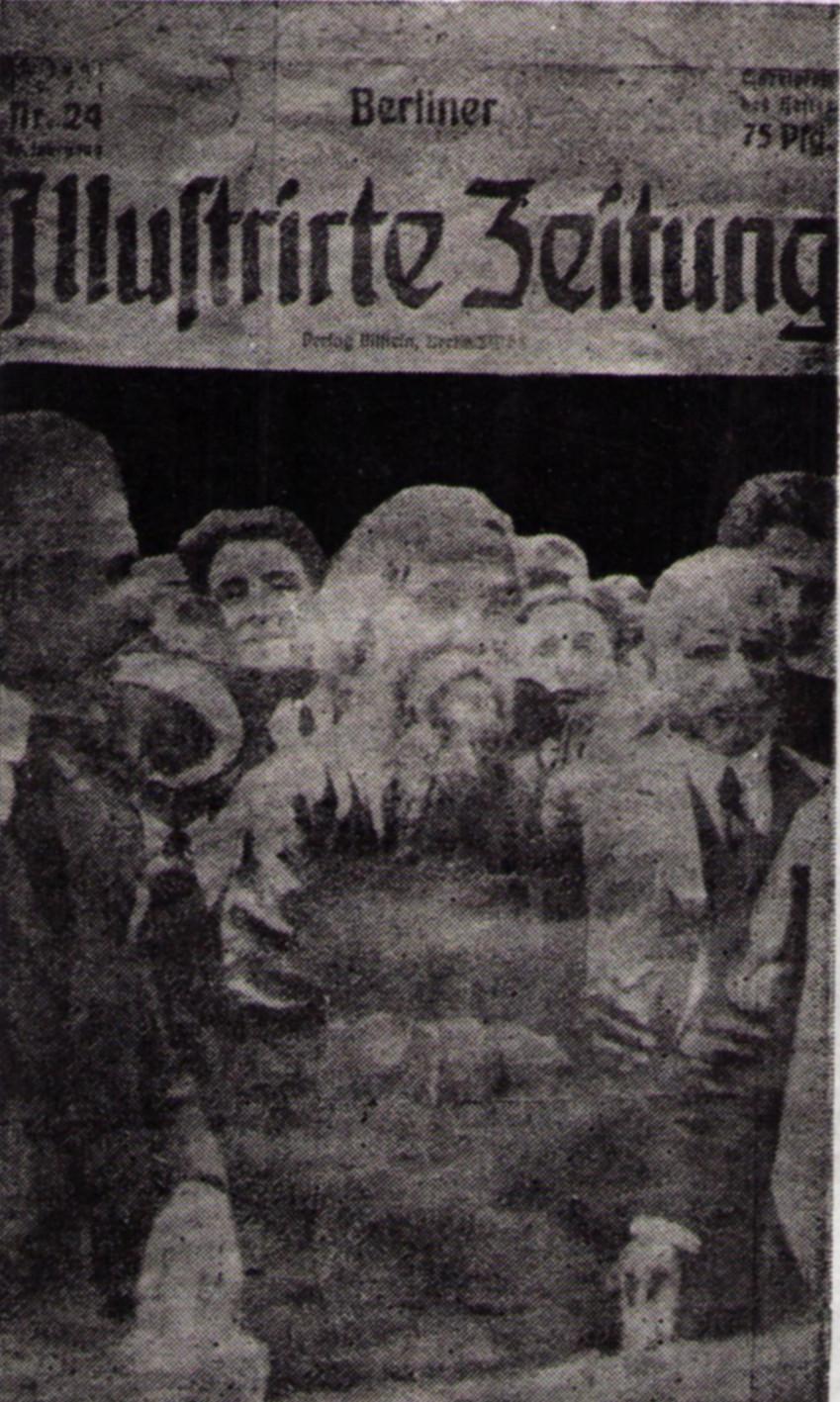
This paper was published in October 1956 in The Voice of Ahinsa - The Indo-German Special Number (Vol. VI, No. 10, pp. 451-455).
Where East and West Meet
It cannot but be admitted that human nature in reality is the same every where and in every time, for, it is based on the immortality and universal consciousness of soul. Outer differences have little force and meaning before the reality of Life. No doubt, East is East and West is West; but it is an outer aspect of thought only, because it is not easy to demarcate a line of division for the limit of East and West. East can be fused in West and likewise West in East. The Laws of Anekānt (universal synthesis based on many sided viewpoint) and Ahinsa (harmony and nonviolence) when do prevail, the outer differences sink away and the twains blend in the ecstasy of Oneness of Life. Just after the World War I am awakening of the sort was seen in Europe and even today the Westerners are desirous to learn and imitate the spiritual Ideal of East. Keyserling's Diary of a Philosopher's Voyage Round the World, Spengler's Decline and Fall of Western Civilisation and painter Paul Cohan-Portheim's Asia as a Teacher were the publications, which indicated the Truth of the oneness of humanity. A German writer reviewing them declared emphatically that:
“Since the war, the people of Europe have longed for peace, not only political peace, but inner, spiritual peace. Aversion to controversy and abhorrence of violence characterize this new attitude. Our Western world is weary; not weary of life, but of strife and hatred. Indeed, our peculiar society and civilization have been found wanting. They were ceasing to function normally even before this tragedy; However, the result has not been apathy and callousness, but new restlessness and new wants,-'a fairer vision beckons to another shore.' People are exploring provinces of the human soul which have remained untouched by Europe's torment, and seem alien to the typical European. Men are looking to the East unconsciously, and therefore sincerely. It is not a mere fashion. The world of Asia draws us with its promise of something new and something that will liberate. We are learning to love the gentleness and the wisdom and the tenderness of the ancient and lofty culture of the Far East. We can study that culture oblivious of the enmities which divide Western nations. Today Germany welcomes as a gospel of salvation, as a glad message, the unwar like doctrines of Far Asia, the pacifist mentality of the Indians and the Chinese.” (Modern Review, Aug: 1921, pp. 230-231)
In India our great Saint and poet Rabindranath Tagore also dreamt an unity of humanity and sounded a warning for the world which still possesses its force and meaning. He declared:
“Uniformity is not unity. Those who destroy the independence of other races, destroy the unity of all races of humanity. Modern Imperialism is that idea of Unity, which the python has in swallowing other live creatures. I have said before, that, if the spiritual altogether swallows up the material interest of man that cannot be called harmony. But when the spiritual and the material keep separate, in their own respective provinces, then they can find their unity. In like manner, when we respect the true individuality of men, then we can discover their true unity.
While Europe, after the great war, has been yearning for peace, the smaller nations have been more and more insistent in claiming self-determination. If a new era is-really to be ushered in, it must be signalised by the overthrow of the monster, Wealth and the monster, Empire, and also of the enormity of organisations. The true unity must be established upon true units. Those who co-operate with the New Age must cultivate there own individuality in order to attain successsfully the spirit that shall unite. They must remember that Freedom (which is the great quest) is not of this or that nation, but of universal man.” - Modern Review, Nov-1921 p. 540
And this unity of humanity develops in a very beautiful expression of heart which rationalises the activities of head and hand as well. Tagore writes, “Wherever man meets man in a living relationship, the meeting finds its natural expression in works of art, the signature of beauty in which the mingling of the personal touch leaves its memorial.” In Bad Godesberg when the Champat Rai Jain India Library came into existence under the auspicious of the World Jain Mission of India and through the laudable efforts of Mr. Lothar Wendel, it received a great reception from the German people and a German artist, Mr. Frahmke, came forward to beautify the rooms of the library with his artistic creations. He prepared a beautiful portrait of Shri Champat Rai Jain. In the face of these living facts how one oan deny the possibility of the meeting of East and West?
As a matter of fact the mission of Tagore was to manifest the real unity of human beings. Accordingly he worked and made cultural tours of the whole world. During one of these tours Tagore visited Europe and was simply amazed at the reception which was accorded to him. He thus expressed his satisfaction over it in a letter written on Oct. 12, 1920 from Paris.
He wrote:
”I had not even a distant idea before I came to the continent what welcome had been waiting for me in Europe. I find that the West has accepted me wholeheartedly, yet I had never sought for this recognition. The preparation has been going on without my knowing it and this only convinces me that my mission in life is in the hands of a higher power. I see clearer every day what is asked of me and what is the meaning of my Shantiniketan. The West and the East are to meet in the coming age, and there must be seats made for such meeting.”
Tagore in Germany
Tagore celebrated his Sixtieth birthday in Europe. He was far from his motherland, yet he was accorded a very joyful reception there. His German friends and admirers expressing their joy and gratitude on the occasion declared:
“More successfully than any other man in Morning-land or Evening-land has he enabled us to see clearly the force which binds different peoples together, which resides within the human soul, when it is aware of its worth, its depth and its solidarity. It has not fallen to the lot of any other living poet and thinker that so many people simultaneously in the land of the Ganges, and in the distant lands of Europe from the South to the high North, have listened to the harmony of his thought, the melodious ring in his poems and to the force of his sentiments.”

Tagore in Berlin
Among the signatories of this declaration were such distinguished German personalities as Count Keyserling, Count Bernstorff, Prof. Dr. Eucken, Prof. Dr. Hermann Jacobi and others, who presented a set of German books to the great poet on his birthday. About the grand reception accorded to Tagore at that time in the University of Berlin, the German paper "Hamburger Zeitung" published the news, with following editorial remarks:
“Was there not perhaps just a slight touch of a feeling of sensation in us when last night we were waiting in the hall of the University to see the great Indian face to face? If there was such a feeling in us-for we can not help being Europeans - it disappeared the very moment Tagore entered the hall. A mystic power drew us up from our seats to greet this man in silence. Seldom did the mystery of communion become so manifest.
We become conscious of what seems to us something almost incomprehensible; that in this man's life there is no moment he does not feel the union with the infinite. Thus he stood there and spoke to us put of the simplicity of his heart. And his very first words were characteristic: 'The greatest event of our century has been the meeting of the East and West.'
Never did we poor disunited children of this century feel a greater longing for harmony than we do now. Pining in hell, visions of some Paradise still to be gained haunt our dreams. A man came to us from another world. Never were we riper for his coming - nor worthier of it. The farewell to him yesterday showed it.
Hundreds of people were waiting outside the University to see Tagore once more. He came - and the hands were stretched up to him in silence.
Longing? No, fulfilment. One moment of fulfilment. Thus new men come to know that they are one great community. This silent homage was the expression of a new mankind. We shall never forget this high symbol.” - Modern Review, Aug. 1921, pp. 247-449
Jacobi in India
Turning to India, the motherland of spirituality and hospitality, we find her people true to honour knowledge and wisdom. Max Mailer and Jacobi are the outshining personalities among the German Scholars who commanded respect from Indians. Jacobi could hardly step on this Sacred land of Tirthankaras and Buddhas, that ere this his fame and name became familiar in the country. In fact, Jacobi was an outstanding German Savant who enriched the treasure of Oriental Learning by his various valuable contributions and even led the front of research in different branches of Indological studies. Muni Jina Vijaya remarks further about him that “in the fields of Jaina and Prakrit studies Prof. Jacobi can be looked upon as a Pioneer, and his investigations,extended over dozens of years have a unique value in assessing the progress of studies. It is mainly due to his labours that suitable position could be assigned to Jainism and Jaina philosophy in the evolution of religion and thought on the Indian soil. It is to him that we owe the authentic translation of four canonical works in the S. B. E. series; the two Introductions form a substantial contributions to our-knowledge of Jainism, especially of its career earlier than Buddhism.”
Indeed it was Jacobi who proved and declared Jainism as an independent religion of India and not an offshoot of either Vedic or Buddhist religion. Jainism was in prevalence long before Mahavira. Jacobi wrote that “Mahavira is without doubt the last prophet of the, Jains, the last Tirthankara. His predecessor, Parshva, the last Tirthankara but one, seems to have better claims to the of founder of Jainism.” He regarded Parshva as an historical personage, but later on in the face of research data he had to modify his observation regarding the origin of Jainism. Jacobi declared: “But there is nothing to prove that Parshva was the founder of Jainism. Jain tradition is unanimous in making Rishabha, the first Tīrthankara (as its founder) … there may be something historical in the tradition which makes him the first Tirthankara.” - Indian Antiquary, Vol. IX, pl63.
In the memorable year of 1912 Jacobi was invited to India by the University of Calcutta to deliver a series of lectures on Indian Parasody. When the Jains of India came to know about his arrival to their country a thrill of joy ran through them; for, they were anxious to have an occasion to express their gratitude to the great savant for his laudable researches in respect to Jainism. So the Jainas arranged public receptions in his honour at Ajmer, Jodhpur and other places and presented the sets of their sacred books to him. At Banaras the annual function of the Syadvada Maha-Vidyalava was being celebrated. At that occasion the All-India Jaina Association convened a big meeting in the honour of the great German Savant. Jacobi delivered a learned lecture on Jainism in this gathering. The Jains felt gratified and conferred on him the title of "Jaina-Darshan-Divakara" (the Sun of the Jaina Philosophy), which still carries with it its own significance, as it is found rarely that a community honours a savant of foreign country and Christian belief as the Jainas did.
Jacobi was the head of the Dept. of Sanskrit and Prakrit at the University of Bonn. He was an erudite scholar, who turned out such prominent scholars as Dr. W. Schubring, Dr. T. K. Laddu, Dr. Kanakura and many others. His interest in Jainism remained fresh even after his retirement. When Muni Jina Vijaya went to Germany in 1928, Jacobi immediately came from Bonn specially to meet him in Hamburg and invited him with great affection to stay with him for some months. He had high admiration for the cultural contributions of Jainism and Jaina literature in enriching the Indian heritage and evinced a fervent enthusiasm for the progress of studies connected with them. When the Jaina Literature Society" was established in London, perhaps in 1911, Jacobi was elected its honorary president, which office he held for many years. Later on when Shri Champat Rai Jain visited Germany, Jacobi was pleased to meet him. The letter which he wrote me at the time showed his undiminished interest in Jainism.
These and many more of such facts of cultural contacts reveal the flexibility of human nature, which always welcomes and rejoices in amicable interconnections, where East and West meet in wisdom and harmony.
 |
Tagore leaving Berlin University after one of his lectures (cover of a German newspaper, 1921) |
 Kamta Prasad Jain
Kamta Prasad Jain